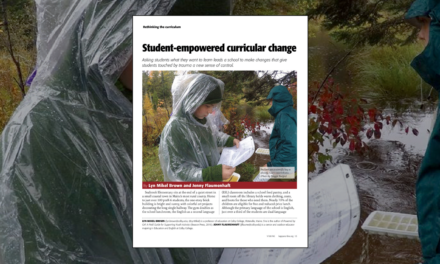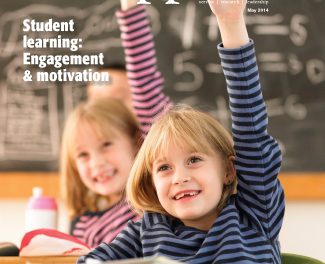A look back
 “Give Us This Day Our Daily Dread: Manufacturing Crises in Education”
“Give Us This Day Our Daily Dread: Manufacturing Crises in Education”
By Gregory J. Cizek, May 1998
This classic Kappan article discusses the tendency to treat every problem in education as a crisis that “cries out for remedy by legislators and policy makers.” On top of that, Cizek writes, the solutions presented tend to take a “top-down” approach, supported by “absent, skimpy, or equivocal” evidence. He goes on to explain that, while American education faces serious challenges, it’s important to distinguish real crises from lesser problems and to seek solutions that “take into account the complexities of the educational process, among them, student motivation, parent involvement, and community and cultural support for education.” He urges leaders to step away from a crisis mentality that reacts to events and adopt a more forward-thinking “focus on innovation and anticipation of what challenges the future hold.”
PDK members can read the full article by logging in to the member portal and searching the Publications Archive.
“Everything that is good in this country, everything that is worthy in this country, everything that is beautiful in this country, begins with a teacher.” — Kurt Russell, 2022 National Teacher of the Year, keynote address at the 2023 Educators Rising conference
Research connections
The promise of ChatGPT
Teachers increasingly view artificial intelligence tools like ChatGPT as having a positive impact on education, according to a recent survey by the Walton Family Foundation and Impact Research. They are embracing new technology: 63% of teachers say they’ve used ChatGPT for their job, up 13 points from a previous survey five months earlier. Four in 10 teachers report using it at least once a week (40%).
A majority of teachers who’ve used ChatGPT say it positively impacted their classes (84%). They are optimistic about the promise of ChatGPT: 61% say it will have legitimate educational uses that can’t be ignored, versus just 23% who believe it likely will only be useful for students to cheat.
Source: Walton Family Foundation. (2023, March 1). Teachers and students embrace ChatGPT for education.
“Too often we do not tell stories of triumph, such as the stories of teachers who show up every day, striving for a holistic and complete education for their students, regardless of the limitations of standards, curriculum, or society. We also do not tell the stories of triumphs of children who are victorious despite being immersed in a system that is not designed to embrace their histories, identities, literacies, or liberation.” — Gholdy Muhammed, Unearthing Joy: A Guide to Culturally and Historically Responsive Curriculum and Instruction (Scholastic, 2023)
Preschool enrollment rebounding after pandemic lows
Preschool enrollment in most states is growing, according to a National Institute For Early Education Research report. The pandemic had erased a decade of enrollment progress in state-funded preschool.
In the 2021-22 school year, 32% of four-year-olds attended a state-funded preschool, up from 28% the year before, the report found. The report found uneven progress nationally and state-by-state. The increase was boosted by universal access to preschool laws recently enacted in California, Colorado, Hawaii, and New Mexico. Several states are working toward universal preschool access, including Michigan, Illinois, and New Jersey.
Source: Friedman-Krauss, A., Barnett, W.S., Hodges, K.S., Garver, K.A., Weisenfeld, G.G., Gardiner, B.A., & Jost, T.M. (2023). The state of preschool 2022. The National Institute for Early Education Research.
Indiana summer program boosts student achievement
Students who attended an Indiana summer learning and enrichment program showed double-digit proficiency point gains in English language arts (ELA) and math for the second year in a row. A report by The Mind Trust and United Way of Central Indiana revealed that students achieved an average ELA and math score improvement of 15 percentage points from beginning to end of program.
The Indy Summer Learning Labs is a five-week, free or low-cost summer program that enrolls more than 5,000 1st- through 9th-grade students in Indianapolis, serving students who may not normally have access to high-quality summer programming.
Source: Mind Trust and United Way of Central Indiana. (2022). Indy Summer Learning Labs: Progress and Successes.
Conversation piece
This issue of Kappan focuses on some of the good things that are happening in schools, even at a time when the news about education seems consistently bad. Use these questions to reflect on the issue with your colleagues:
- What’s one of the most positive school experiences you’ve had in the past year?
- Why do you think it’s so hard to find positive stories about education? Is that a reflection of today’s reality or a societal tendency to focus on the negative?
- What value is there in seeking out positive stories about schools?
- How can you take time to focus on the good around you, without neglecting or denying the problems?











